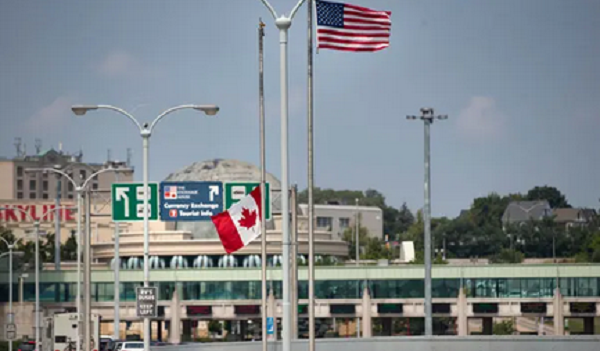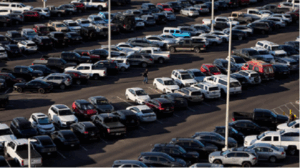Over 200 immigrants held at Detroit facility near Canadian border, U.S. congresswoman alleges
More than 200 people, including children under the age of 6, have been held in “secret” detention at the Port of Detroit in recent months after being apprehended at the Canadian border, a U.S. congresswoman and immigration rights groups say.
Democratic Representative Rashida Tlaib of Michigan visited two U.S. Customs and Border Protection (CBP) detention sites at the port facility near the crossing to Windsor, Ont., after advocates raised concerns about a lack of appropriate food and medical care for detainees.
Miriam Aukerman, senior staff lawyer with the American Civil Liberties Union of Michigan, said CBP has refused to provide official data on the number of people in its custody at the northern border, adding that lawyers have been unable to offer legal support to detainees.
“Access is really important so that people don’t disappear, so they aren’t deported in the middle of the night without ever seeing a judge,” she said.
“Democracies don’t allow government agents to lock people up in secret when no one knows where they are.”
The Port of Detroit sites include an office building that is “not equipped for detention or long-term stays,” Ms. Tlaib said at a Thursday news conference. “There’s no facility to go to the bathroom. You have to go to a different location.”
While CBP holding facilities are meant to be for short-term detentions of less than 72 hours, Ms. Tlaib said border officials told her that at least one person was recently held for almost two weeks.
A sweeping immigration crackdown ordered by U.S. President Donald Trump in January has heightened Canadian refugee advocates’ concerns about a bilateral refugee treaty premised on both countries being safe for asylum seekers.
Under the terms of the Safe Third Country Agreement (STCA), asylum seekers must claim protection in the first safe country they enter, meaning that they cannot pass through the U.S. to make refugee claims in Canada and vice versa.
“There is significant evidence that the U.S. is not a safe country for refugees, not only because of conditions of detention that do not meet basic human-rights standards, but because the right to asylum seems to be in complete suspension in the U.S.,” said Gauri Sreenivasan, co-executive director of the Canadian Council for Refugees (CCR).
In a statement, a U.S. CBP spokesperson confirmed that border authorities had encountered more than 200 foreign nationals at the border crossing between January and March. The spokesperson said about half were transferred to Immigration and Customs Enforcement (ICE) detention, while the remaining people were only detained while being processed by border officials and then released.
The Port of Detroit facility was established by CBP to accommodate foreign nationals, including undocumented families, while they await transfer to ICE custody, the spokesperson said.
“This facility has seldom been utilized, as there has not been an influx of family units encountered at our ports of entry.”
Advocacy groups say prolonged custody in makeshift facilities is part of a concerning pattern developing since Mr. Trump signed executive orders to increase detention and deportation of migrant communities. Ms. Tlaib said border officers told her that about 90 per cent of detainees were placed in custody after making accidental crossings into Canada.
Ruby Robinson, managing attorney at the Michigan Immigrant Rights Center, said the remaining detainees held at the border are likely asylum seekers turned around under the STCA.
CBP confirmed to The Globe and Mail last week that it now intends to detain asylum seekers turned back by Canadian border officials under the terms of the agreement. A CBP spokesperson said individuals returned to the U.S. from Canada will be transferred to an ICE facility for removal from the country.
CBP said people held in custody for more than 48 hours can be identified through an online detainee locator. Mr. Robinson said he has never been able to find a client in CBP custody through this tool.
The STCA contains exemptions that allow some asylum seekers to request protection in Canada, like those who have family here. But without access to legal support, these claimants cannot challenge Canadian border officials’ decisions to turn them away, said Ms. Sreenivasan of the CCR.
Aisling Bondy, president of the Canadian Association of Refugee Lawyers, said her organization has long been critical of the STCA and called for it to be immediately suspended. Failing that, she said the government should expand existing public-interest exceptions to the agreement and conduct a review of whether the U.S. should be considered safe for asylum seekers.
“Learning about the deplorable detention conditions faced by people turned back to the United States at the Canadian border heightens our concerns,” she said.
Those ensnared by the shift to detention at the northern border include an undocumented mother from Guatemala and her two children, ages 1 and 6, who were detained for almost a week at the Ambassador Bridge office building. The family had been trying to go to Costco, but their GPS took them to the nearest outlet – in Windsor.
By the time they realized the mistake, they were on the one-way toll route to Canada and could not turn back, said Mr. Robinson, who is representing the mother.
He said he was denied access to his client for the duration of her detention. She kept her children — who are U.S. citizens — with her rather than separate from them. There were no diapers on site and no medication was provided when the children developed a cough and fever, Mr. Robinson said.
After five days, the mother decided to release the children to a family friend, fearing for their health. She was held in detention for another day before being released – and now faces possible deportation.
In a statement about the woman’s case, CBP assistant commissioner Hilton Beckham said the border authority worked to find a suitable guardian for her children, but her decision to keep the family together prolonged the detention period.
“When individuals violate immigration laws, their choices make them subject to detention and removal,” the statement said.
A CBP spokesperson said the organization tries to minimize the time it holds people in custody, with detention times being influenced by operational requirements, case complexity and other factors.
Ms. Tlaib said she has pressed border officials for information about a Venezuelan man, allegedly a member of the Venezuela-based Tren de Aragua gang, who recently attempted suicide at a CBP detention facility at the Detroit-Windsor tunnel.
A CBP spokesperson said its officers are trained to respond to any attempt at self-harm, and owing to staff intervention, the detainee was transported to a local hospital, where he was cleared to return to custody.
The man was subsequently transferred to an ICE-contracted detention facility.
In a statement, a spokesperson for Immigration, Refugees and Citizenship Canada said the government “continues to closely monitor” developments south of the border.
“The Government of Canada strongly discourages irregular border crossings,” the statement said. “They are illegal, risky and dangerous.”
This article was first reported by The Globe and Mail














